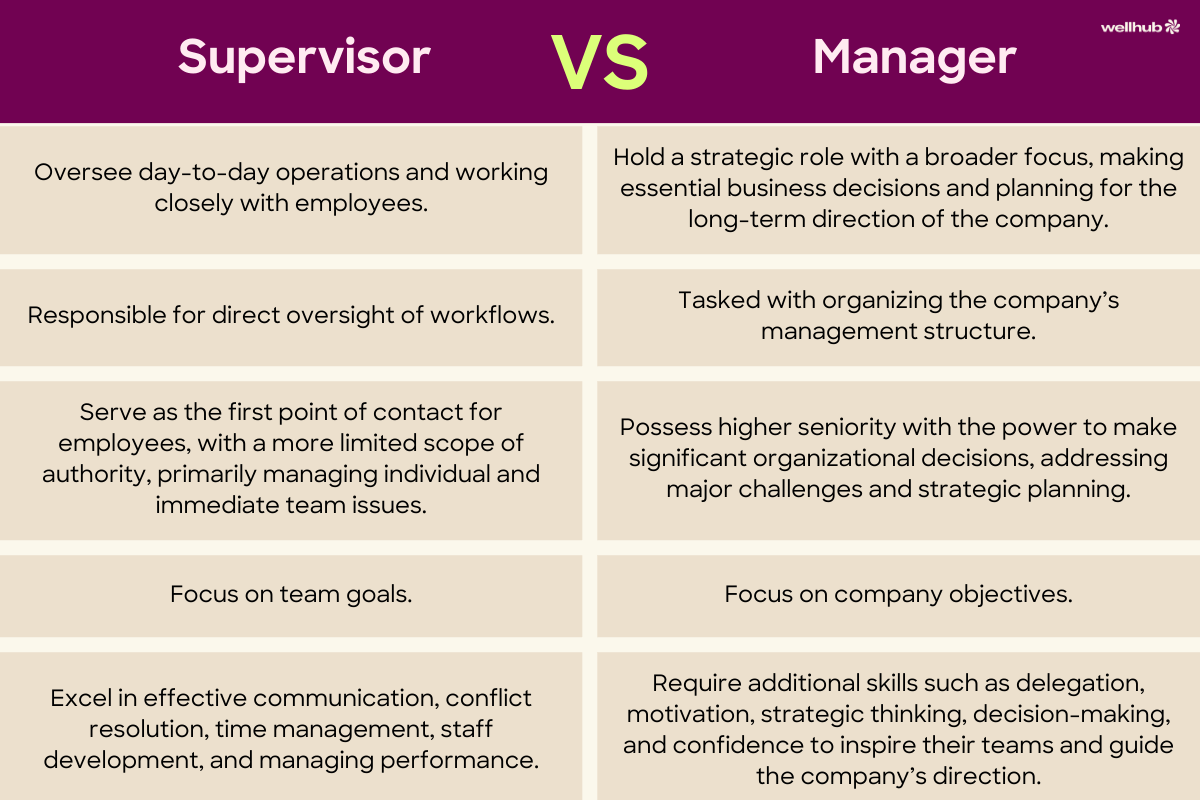Supervisor vs. Manager: The Key Differences in Leadership Roles
Last Updated Jan 28, 2025

Having great leadership is not just beneficial for your company. It’s essential. With qualified people at the helm, many organizations see improved productivity in the workplace and a more positive work environment.
That being said, there are different roles involved in leadership. Supervisors and managers are often discussed as one, but there are key differences that set them apart. Each plays a distinct part in steering your company toward success.
Differentiating the two roles can help you support your people and foster the growth needed to meet business objectives. Discover the roles and responsibilities of both supervisors and managers, where they differ and where their paths intersect.
Supervisor vs. Manager — What’s the Difference?
What Is a Supervisor?
Supervisors are a lower level of management and often work directly alongside employees. One of their main responsibilities is being the first point of contact between their teams and leadership.
Additionally, individual contributors will likely report issues directly to their supervisors and turn to them for support.
These are some common duties an HR supervisor may perform:
- Creating performance goals
- Overseeing workflows
- Assisting with employee work when needed
- Coaching team members with feedback
- Keeping track of schedules
- Creating performance reports for managers
- Choosing individuals who are eligible for promotions or raises
- Helping train new hires
The exact role of a supervisor will, of course, depend on the individual workplace and their specific needs. In some organizations, the role of a supervisor may not be needed. For example, a small company or startup with only 10 employees might only require a manager to oversee everyone.
What Is a Manager?
A manager makes essential business decisions that affect overall operations. It’s a strategic role that helps determine where the company is headed. They may lend a hand in setting overarching business goals and allocating resources. Typically, a manager will rank higher than a supervisor.
Some of the unique responsibilities of an HR manager are:
- Organizing the company’s management structure
- Collaborating with HR to recruit and hire top talent
- Organizing training opportunities
- Delegating tasks and giving performance feedback
- Working with HR to create policies, benefits, and perks
- Communicating important information on business goals to workers
Most organizations need some kind of manager at the helm.

How Supervisors and Managers Are Similar
Though distinct, there are some of the ways that these two roles overlap:
- Oversee the workforce. Both leaders support day-to-day operations and make decisions with their teams.
- Apply leadership styles. Whether you’re a transformational or coaching leader, managers and supervisors identify their strengths and utilize them. Identify ways to elevate. Each of these individuals actively works to identify ways to enhance employee performance and business operations.
- Evaluate employee performance. Both positions typically provide feedback and evaluations, but supervisors often focus on individuals and managers look at teams.
How Supervisors and Managers Are Different
The gaps between these two roles highlight why both can be important to your organizational structure.
Authority Level
Supervisors typically occupy a lower-tier leadership role and report directly to managers, who possess higher seniority. While managers make strategic decisions, supervisors focus on overseeing daily operations.
Generally, multiple supervisors may report to a single manager, whose authority may extend up to directors or a board, depending on the organizational structure.
Differences in authority levels dictate distinct responsibilities. For instance, supervisors may not have the power to dismiss employees. Instead, they serve as the initial contact for escalating issues to higher leadership levels. Managers are responsible for addressing significant challenges, often in collaboration with HR, to determine an employee's future at the company.
Supervisors also act as the primary point of contact for employees, who may only escalate concerns to managers under specific circumstances. Those may include encouragement from supervisors or issues with the supervisor's handling of situations. This structure ensures a clear flow of communication and decision-making within organizations.
Responsibilities
Supervisors often have a more hands-on role in overseeing the day-to-day operations and performance of frontline employees. Their focus is typically on immediate tasks and support.
Managers, on the other hand, tend to have broader responsibilities. These could include planning strategy and then delegating tasks.
While supervisors are typically more involved in the operational aspects, managers work on aligning those with the overall objectives of the organization.
Salary
Managers often have higher salaries their critical role in the organization requires constant work. That leads to an average salary in the U.S. of $73,794. While supervisors make less, they typically earn more than front-line employees, with an average salary U.S. supervisor earning $60,005.
Objectives
These two positions have different goals to be successful. A supervisor’s goals are primarily internal. They coordinate with workers within their department to ensure the completion of their projects.
To do that, the supervisor often facilitates training. That also helps ensure that an individual knows exactly how to perform their role efficiently and effectively. For example, an HR supervisor might teach an employee a new type of software. After showing them how it works, they might provide tips on how to use it better.
A manager’s goals are typically oriented beyond their own individual teams. They’re usually accountable for the company’s performance. That often involves time spent designing a strategy to achieve long-term profits and sustainability. Usually, they don’t get involved with individual tasks.
Here’s how this difference might play out:
A supervisor for a finance department will regularly train their workers and set quarterly goals with them. If an individual hits a snag, the supervisor will try to work it out. The manager won’t be involved unless the supervisor reaches out to them. That could happen if the problem escalates to the point it would slow down department performance. In that case, the manager would try to resolve the issue and get the team back on track.
Top Skills for Supervisors
What makes someone successful in this role? They usually have these abilities:
Effective Communication
Strong conversational skills are one of a supervisor’s most important assets. Because they are working with people, they need to be able to communicate with them. They would also need to discuss progress and goals with a manager.
Conflict Resolution
Being a leader of a team comes with the inevitable reality of conflict. A good supervisor will be able to help resolve that quickly, ensuring that their teams remain aligned and collaborative.
Time Management
Balancing responsibilities requires the ability to stay focused. A supervisor needs to be aware of how long certain tasks take to plan appropriately.
Staff Development
Supervisors are expected to help individuals grow. Highly effective ones are able to balance pushing for excellence and empathy.
Managing Performance
Critical for enhancing team output, supervisors must excel in assessing work and driving continuous improvement.
Top Skills for Managers
While supervisor abilities also apply to a manager, they need a few more aptitudes:
Delegation
Managers assess the skills of a team and determine the best fit for tasks. Being effective at this can improve productivity and efficiency.
Motivation
A great manager will be an excellent motivator. They might utilize competitions or incentives to help foster an engaged team.
Strategic Thinking
Managers plan for the future and implement strategies. To be good at this, someone needs to be able to think through scenarios and potential outcomes.
Decision-Making
Critical in guiding teams and departmental direction, managers' ability to make informed and effective decisions impacts the overall effectiveness and progress of their teams.
Confidence
Understanding that you and your teams are capable of greatness can be motivating. A great manager believes in their team's capabilities and works to inspire and develop confidence in their employees.
Leading Together for Employee Wellness
Supervisors and managers ultimately are a team that strives to build up the employees at your company.
One way leadership can support your teams is by creating wellness programs. Crafting effective initiatives is a way to show your people that you care about them — and that they can trust their leaders. That's why nine out of 10 c-suite executives say wellbeing programs are important for employee satisfaction and retention.
To learn about how a wellbeing program can help your employees, talk to a Wellbeing Specialist.

Company healthcare costs drop by up to 35% with Wellhub*
See how we can help you reduce your healthcare spending.
[*] Based on proprietary research comparing healthcare costs of active Wellhub users to non-users.
References
- CMOE. (n.d.). Supervisor vs. Manager Roles: The Key Differences and Skills. Retrieved April 11, 2024 from https://cmoe.com/blog/the-key-differences-and-skill-between-supervisor-vs-manager-roles/#:~:text=Supervisors%20and%20managers%20both%20hold,needs%20of%20their%20team%20members.
- Cox, T. (2020, December 10). Supervisors vs Managers: Learn Their Similarities and Differences to Figure Out Which You Need. Software Advice. Retrieved April 11, 2024 from https://www.softwareadvice.com/resources/supervisors-vs-managers/.
- GBS Corporate. (n.d.). Great Leadership Improves Productivity. Retrieved April 11, 2024 from https://www.gbscorporate.com/blog/great-leadership-improves-productivity.
- Hoick. (2023, July 13). The Role of Leadership in Influencing Employee Retention. LinkedIn. Retrieved April 11, 2024 from https://www.linkedin.com/pulse/role-leadership-influencing-employee-retention-mxhoick#:~:text=Employees%20who%20trust%20their%20leaders,leads%20to%20higher%20employee%20retention.
- HRDQ. (2022, September 22). Skills For Supervisors: 15 Qualities Of A Good Supervisor. Retrieved April 11, 2024 from https://hrdqstore.com/blogs/hrdq-blog/skills-for-supervisors-15-qualities-of-a-good-supervisor.
- Indeed. (2023, July 31). Manager vs. Supervisor: What's the Difference? Retrieved April 11, 2024 from https://www.indeed.com/career-advice/career-development/manager-vs-supervisor.
- Indeed. (2023, March 28). 21 Skills of a Good Manager. Retrieved April 11, 2024 from https://www.indeed.com/career-advice/career-development/skills-of-a-good-manager.
- Indeed. (2023, October 25). Manager salary in United States. Retrieved April 11, 2024 from https://www.indeed.com/career/manager/salaries?from=top_sb.
- Indeed. (2023, October 25). Supervisor salary in United States. Retrieved April 11, 2024 from https://www.indeed.com/career/supervisor/salaries.
- Perry, E. (2021, August 10). In manager vs. supervisor, find out which differences matter. BetterUp. Retrieved April 11, 2024 from https://www.betterup.com/blog/manager-vs-supervisor.
Category
Share

The Wellhub Editorial Team empowers HR leaders to support worker wellbeing. Our original research, trend analyses, and helpful how-tos provide the tools they need to improve workforce wellness in today's fast-shifting professional landscape.
Subscribe
Our weekly newsletter is your source of education and inspiration to help you create a corporate wellness program that actually matters.
Subscribe
Our weekly newsletter is your source of education and inspiration to help you create a corporate wellness program that actually matters.
You May Also Like

Is a Functional Structure the Best Fit for Your Company? | Wellhub
Discover what a functional organizational structure is and find out if it's the right choice for your company's performance and growth.

Organizational Structure: What it is, Types, and Benefits | Wellhub
The right organizational structure can impact your business strategy. These are the different types to choose from, including pros, cons, and benefits.

Use Contingency Theory to Develop Dynamic Leaders | Wellhub
Contingency contradicts the "one size fits all" notion of leadership by acknowledging how complex challenges warrant the need for adaptable leaders.